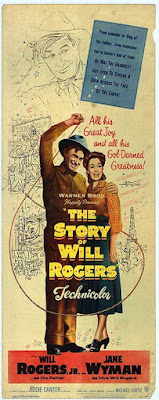Smooth and effective, this neatly handled bio-pic of actor/columnist/rope-twirler/humorist Will Rogers sets limited goals and achieves them with straight-forward storytelling. The one big cheat comes in using Will Rogers’ dad, who died in 1911 before his career took off, as a sort of lifelong disapproving foe. Not that it matters much in this pleasant film, with a fine turn from Will Jr as his dad.* He keeps from pushing too hard or overselling the laughs in the material, Rogers’ didn’t become the most beloved performer of his time thru rope tricks, riding skills or anodyne Populism, but with charm & contagious decency. It radiated out of the man, and his son had more than enough to play him. Ambling along without the usual trials & tribulations once Rogers spontaneously stumbles upon a topical monologist act, lightly seasoned with his Cherokee cowboy mein & roping skills. Few obstacles to overcome, instead, ride along and enjoy the handsomely designed & shot TechniColor view with director Michael Curtiz neither phoning it in nor working too hard for big effect. As the understanding wife, Jane Wyman is fine, as is the rest of the supporting cast with Slim Pickens extra fun as a cowboy pal (looking hilariously like British indie actor Timothy Spall). And, when we get to Rogers’ debut with The Ziegfeld Follies of 1917 (mispronounced Ziegfield by Rogers!), out pops the real Eddie Cantor in BlackFace. Yikes!
(Some line-up that year with W. C. Fields, Fanny Brice & Bert Williams also on the bill!*)
ATTENTION MUST BE PAID: *How many sons played their famous dad in the movies? Hank Williams Jr did it. Eddie Foy Jr played his famous vaudevillian dad a few times, sibilant lisp and all, but the feature film THE SEVEN LITTLE FOYS/’55 had Bob Hope (sans slobber).
SCREWY THOUGHT OF THE DAY: *Cantor wouldn’t have been the only BlackFace performer in the 1917 FOLLIES. Bert Williams, the most famous/best paid/most recorded Black performer of the day also worked in BlackFace.
DOUBLE-BILL: Rogers had a top performing film every year from the start of The Talkies till his death in 1935. They sometimes dawdle (or embarrass modern audiences as he spars with shufflin’ black comic Stepin Fetchit), but his three with John Ford are classics (DOCTOR BULL/’33; JUDGE PRIEST/’34; STEAMBOAT ROUND THE BEND/’35) while probably the best place to start would be with Henry King’s endearing STATE FAIR/’33, far better than its two musical remakes if much harder to get a hold of.



No comments:
Post a Comment